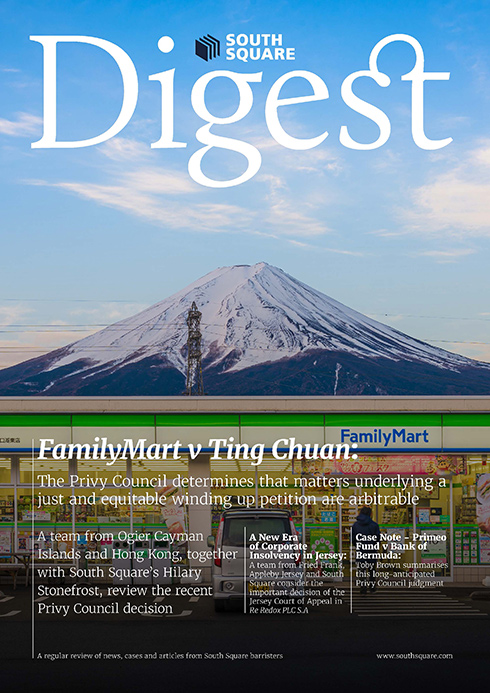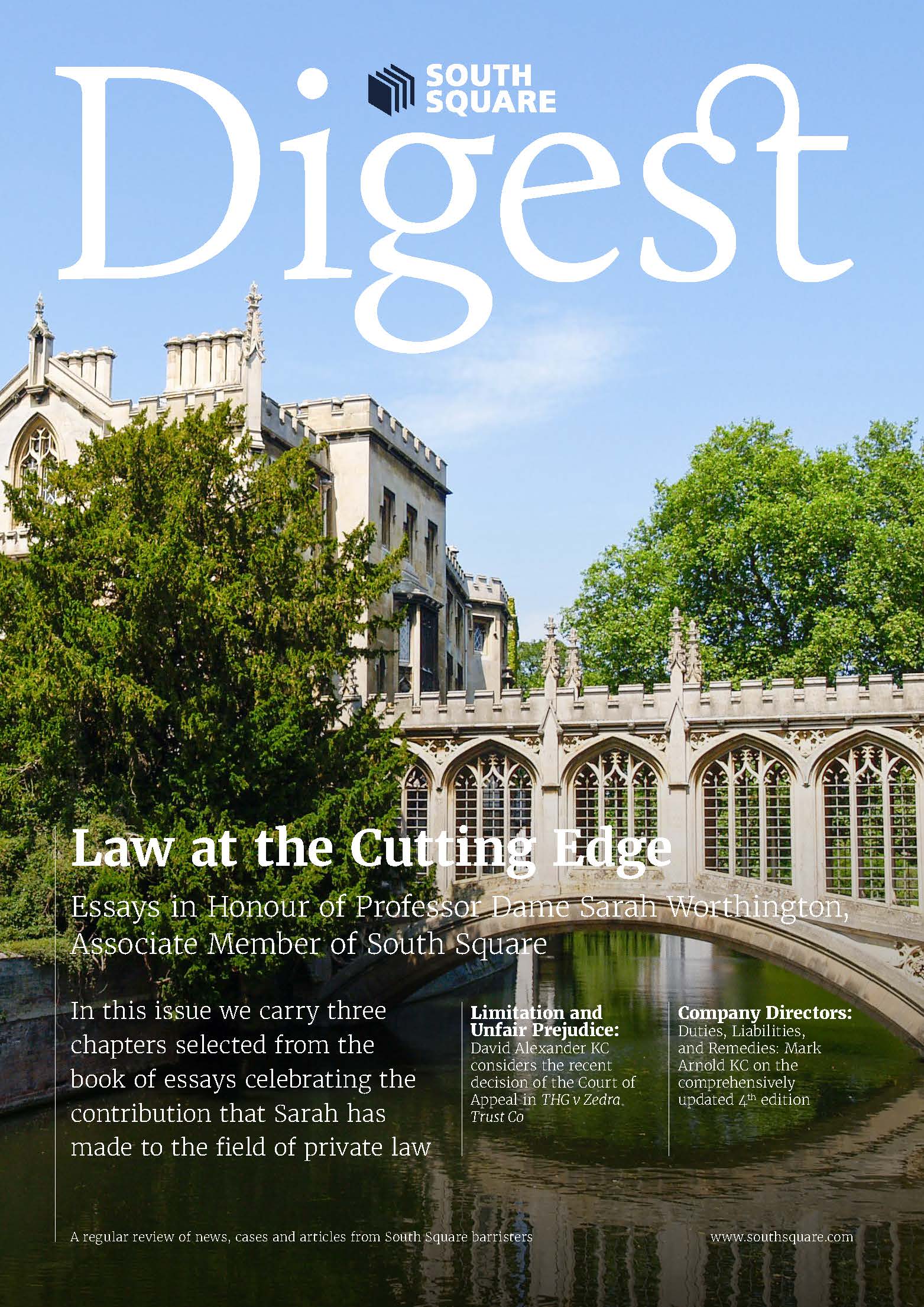

David Alexander KC considers the recent Court of Appeal decision in THG v Zedra Trust Co
The received wisdom of the last 40 years is that no limitation period applies to unfair prejudice petitions, being petitions which are now presented under s.994 of the Companies Act 2006 (“the 2006 Act”)1.
This view has been heavily supported by commentators on unfair prejudice petitions. The current edition of Palmers Company law at para 8.3822 says that “there is no formal limitation period for the bringing of an unfair prejudice petition”. Similarly in Buckley on the Companies Act it is said in the annotations to s.994 para [31] that “there is no limitation period”. Gore-Browne on Companies agrees at chapter 19, para [2] stating that “no specific statutory limitation period applies to unfair prejudice petitions”. In Hollington on Shareholders’ Rights, the most recent edition of which (10th) was published in 2024, it is said that “There is no statutory period of limitation available to unfair prejudice petitions”. The last edition (6th) of Victor Joffe KC’s Minority Shareholders; Law Practice and Procedure states that “There are no statutory limitation periods applicable to claims under” s.994 of the 2006 Act (although it is understood that a new edition of this work is or was due to be published on 14 March 2024).
This view to the effect that there is no limitation period in relation to unfair prejudice petitions has also been supported in the authorities. See, for example, DR Chemicals Ltd (1989) 5 BCC 39, Re Grandactual Ltd [2006] BCC 73 (in which Sir Donald Rattee indicated that he understood “that [s 994] is not subject to any limitation period…”), CF Booth Ltd [2017] EWHC 457 (Ch) in which the Deputy-Judge said that “There is no limitation period under section 994 …” , Re Edwardian Group Ltd (where Fancourt J said that “There is no statutory time limit for issuing a petition…”), Routledge v Skerritt [2019] EWHC 573 (Ch), [2019] BCC 812 (where the Deputy Judge said “There is no time limit for issuing a petition …”) and Bailey v Cherry Hill Skip Hire Ltd [2022] EWCA Civ 531, [2023] Bus LR 14 (where Andrew LJ, with whom Lewison and Snowden agreed, said that “There is no statutory period of limitation applicable to unfair prejudice petitions”). It should also be noted that Cherry Hill Skip Hire was itself cited with approval (albeit obiter) by the Supreme Court in Smith v Royal Bank of Scotland plc [2023] UKSC 34, [2023] 3 WLR 551 where Lord Leggatt (with whom Lords Briggs, Hamblen and Kitchen agreed) said this:
“There are some types of claim which are not subject to any statutory period of limitation at all. One example is a claim for specific performance … Another example is a petition for relief under sections 994 to 996 of the Companies Act 2006 on the ground of unfair prejudice in the conduct of the company’s affairs…”
This view as to the legal position was, furthermore, taken by the Law Commission in two reports. First in Shareholder Remedies (LC 246 para 4.16). Second in Limitation of Actions (LC 270 para 4.211).
On 18 March 2023, Fancourt J issued his judgment in THG Plc & Ors v Zedra Trust Company (Jersey) Ltd [2023] EWHC 65 (Ch). In that judgment, in-line with all the commentators and authorities referred to above, Fancourt J decided that there was no limitation period applicable to a petition under s.994 of the 2006 Act. His main reason for doing so was that he considered himself bound by a decision of the Court of Appeal in Bailey v Cherry Hill Skip Hire Ltd [2022] EWCA Civ 531, [2023] Bus LR 14.
On 23 February 2024, judgment was handed down by the Court of Appeal (Lewison, Arnold and Snowden LJJ) on the appeal from Fancourt J’s judgment in THG Plc & Ors v Zedra Trust Company (Jersey) Ltd. The Court of Appeal reference is [2024] EWCA Civ 158. The Court of Appeal decision is of great importance for all who practice in the field of unfair prejudice. In it, the Court of Appeal:
1. Addressed head-on whether there is a limitation period applicable to a petition under s.994 of the 2006 Act and, if so, what it is.
2. Remarked that they had not been referred to any case in which the question whether a limitation period applied to a petition under s.994 of the 2006 Act had actually been argued and decided.
3. Stated that, with the possible exception of Bailey v Cherry Hill Skip Hire, none of the materials to which it had been referred was binding on it.
4. Decided that Bailey v Cherry Hill Skip Hire did no more than to decide the case in accordance with the received wisdom, without questioning whether that received wisdom was correct.
5. Determined that Bailey v Cherry Hill Skip Hire was not binding on the Court of Appeal and that it therefore had to consider the question afresh.
6. Considered the question afresh and ruled that, in principle, it was possible for a petition presented under section 994 to fall within the scope of the Limitation Act 1980 (because a petition initiating proceedings fell within the definition of “action” in s.38 of the 1980 Act, the definition of “action” being “any proceedings in a court of law”).
7. Concluded that, in principle, a petition seeking relief under s.994 is subject to the 12-year limitation period laid down in s.8 of the 1980 Act (because the right to go to court was purely statutory) unless the claim is one for compensation or monetary relief where the limitation period is 6 years under s.9 of the 1980 Act.
Therefore, in a highly significant decision which upends the received wisdom of the last 40 years in relation to whether the 1980 Act applies to unfair prejudice petitions, the Court of Appeal have very recently decided in THG Plc & Ors v Zedra Trust Company (Jersey) Ltd [2024] EWCA Civ 158, that the limitation provisions prescribed by the 1980 Act do indeed apply to unfair prejudice petitions under s.994 of the 2006 Act. The relevant limitation period in relation to an unfair prejudice petition under s.994 of the 2006 Act will, as a result, be 12 years, unless the claim is for compensation or monetary relief, in which case the relevant limitation period will be the shorter period of only 6 years.
It is yet not known whether the Court of Appeal’s decision will be appealed to the Supreme Court.
1The unfair prejudice remedy was introduced by the Companies Act 1948, although at this stage it was based on “oppression”. The Companies Act 1980 recast the remedy as one based on unfair prejudice.





![Brake & Anor v The Chedington Court Estate Ltd [2023] UKSC 29](https://southsquare.com/wp-content/uploads/2024/02/Brake-Anor-1-scaled.jpeg)










